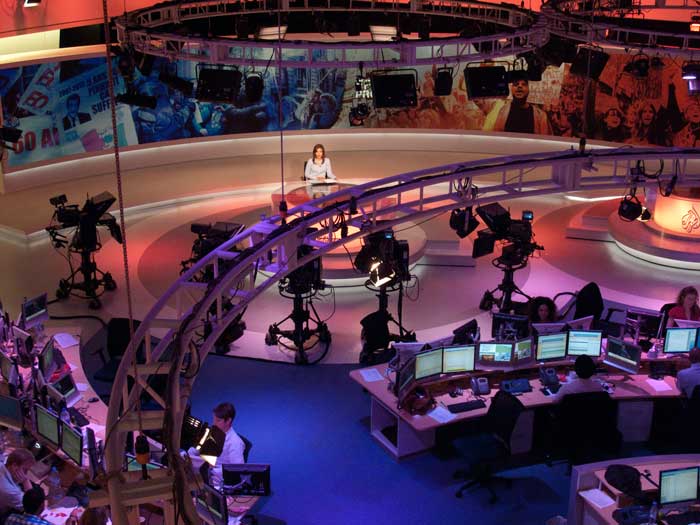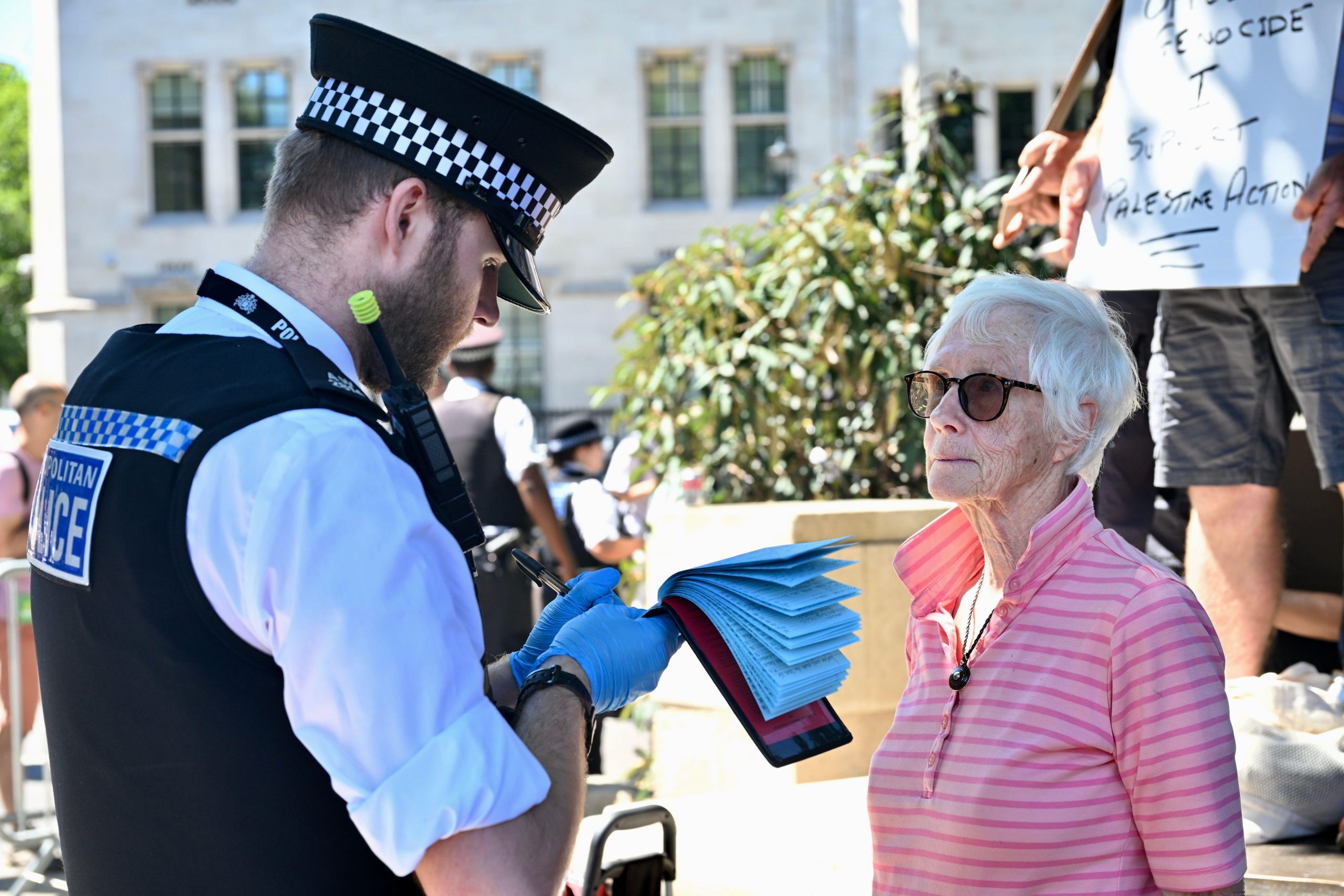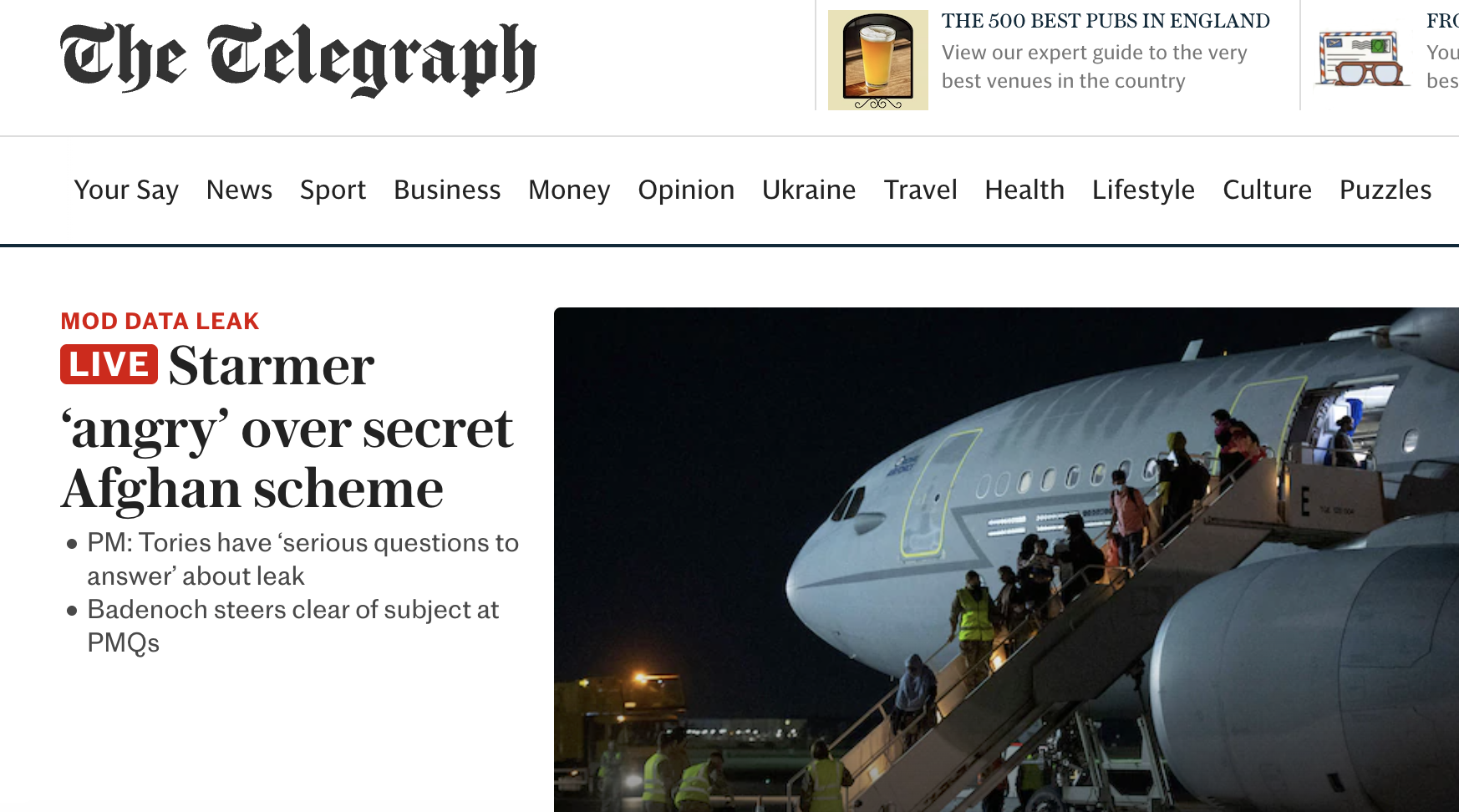[vc_row][vc_column][vc_column_text]

Al Jazeera Broadcast Center in Doha, Qatar
A debate at the Frontline Club last night on the future of Al Jazeera and media freedom in the Middle East, following recent calls for the closure of the television network by a group of seven Arab countries led by Saudi Arabia, did not go to plan.
The original chair, BBC security correspondent Frank Gardner, pulled out of the debate and was replaced by Safa Al Ahmad, a Saudi journalist and filmmaker and the winner of the 2015 Index on Censorship Freedom of Expression Award for Journalism.
According to Arab News, sources within the BBC said Gardner’s decision was because the event was deemed “a propaganda stunt by Qatar and Al Jazeera with no attempt at balance on the panel”. In an email to Arab News, the BBC source allegedly criticised the failure “to invite anyone from the UAE, Saudi, Bahrain or Egypt onto the panel in time”.
A group of 12-15 protesters outside the Frontline Club could be heard during the debate. They chanted, among other things: “Ban Al Jazeera.” They carried Egyptian flags and signs reading: “Al Jazeera Promotes Terrorism.”
Protest happening right now outside @frontlineclub after a talk on Al Jazeera pic.twitter.com/9q3vhc771D
— Sophia Smith Galer (@sophiasgaler) July 17, 2017
This anger was matched inside as audience members aired various grievances, including complaints about the network’s editorial line, its ties to and funding from the state of Qatar, Al Jazeera Arabic’s alleged sectarianism and anti-Shia bias and the treatment of Al Jazeera staff. Some audience members openly supported the calls to ban Al Jazeera.
“Al Jazeera is media prostitution by Qatar,” an audience member shouted at the panel, echoing a protester outside who added that the network wanted to “destroy the Middle East”.
Journalist Ben Flanagan from Arab News, an English-language newspaper published in Saudi Arabia and owned by a member of the House of Saud, put it to the panel that Al Jazeera “has been used as a platform for terrorists and extremists” and asked panelists Giles Trendle, managing director of Al Jazeera English, and Wad Khanfar, the ex-director general of Al Jazeera Media Network: “Do you feel you have blood on your hands?”
During his opening statement, Trendle said: “We are funded by the state of Qatar but we maintain an editorial independence, so there isn’t a lot of direct communication with the channel.”
Khanfar said that while Qatar “is not a charitable organisation”, “the reputation of Al Jazeera and the popularity of Al Jazeera prevented the state of Qatar from using Al Jazeera and they created a healthy distance between us at that time as an editorial newsroom and the state.”
Concerns over the treatment of staff at Al Jazeera almost certainly weren’t eased when Khanfar told Flanagan that if he worked for Khanfar at Al Jazeera he would be fired if he had any objections to interviewing a controversial figure like Osama bin Laden.
“Staff are leaving, but within any organisation there is a certain churn rate,” Trendle later added. “People come and people go.”
At one point an audience member took to the aisle, interrupted Khanfar and shouted something about Al Jazeera’s failure to report on “American involvement” in the 2012 sarin gas attack in Damascus, a conspiracy theory originated by journalist Seymour Hersh and propagated on media outlets such as Alex Jones’ Infowars.
Al Jazeera isn’t the only news outlet Saudi-led coalition’s crosshairs. The London-based Middle East Eye is also on the list. Editor David Hearst, one of last night’s panellists, clarified that the news website is independently funded. “We’re not funded by Qatar,” he said. “If Qatar rolled over, it would have absolutely no effect on us.”
Hearst believes that the reason these Arab states – including Egypt, Bahrain and the UAE – are attacking certain media organisations is that “they are really dead scared of independent criticism or examination of what’s going on,” particularly when such criticism is in Arabic. “They don’t like their own people, Arabs, reading genuinely independent news, and that is what I think started this whole thing off.”
Hearst said that the reach of Al Jazeera, which has an audience 310 million households in more than 100 countries, makes the network, in particular, a threat.
Trendle gave assurances that despite the current pressure, Al Jazeera will not be shutting its doors and remains committed to “balanced, professional” journalism. “It’s kind of business as normal in an abnormal situation,” he said.
“As journalists, we all need to stand together in solidarity against this intimidation, against this bullying. We need to stand against being censored or silenced in any way at all,” Trendle added. “We all need to stand in unison as journalists because journalism is under attack, and in recent years it’s become much clearer that it is coming under attack in a very serious way from governments as well.”
Panellist Marc Owen Jones, a professor at the Institute of Arab and Islamic Studies at Exeter University, while agreeing with Trendle, added that there needs to be a broader conversation about public service broadcasting.
“How can we have commercial media if it’s funded by weapons manufacturers? If we’re covering health case, we can’t have it funded by Big Pharma? You have to ask questions. Is it problematic to have media channels funded by non-democratic states or authoritarian states in the region if you want to really progress to another level of journalism?”
A proper debate is still to be had as Monday’s shouting match didn’t quite achieve its aim.
Index on Censorship re-iterates its position given by Index magazine editor Rachael Jolley in June: “Al Jazeera and press freedom must not be used as a bargaining chip.”[/vc_column_text][/vc_column][/vc_row][vc_row][vc_column][vc_basic_grid post_type=”post” max_items=”4″ element_width=”6″ grid_id=”vc_gid:1500396083270-89581cd9-54bd-6″ taxonomies=”449″][/vc_column][/vc_row]




